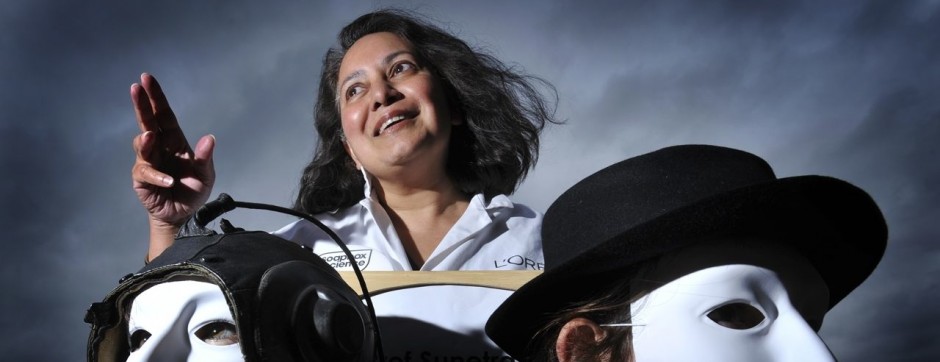 Debbi Pedreschi is a Postdoctoral Researcher working on finding ways to implement the ecosystems approach to fisheries management at the Marine Institute, Galway, Ireland. You can catch Debbi on her soapbox on the July 15th in Galway, where she’ll give a talk called: ““The story of sustainable fisheries: solving ‘wicked problems’ and other tales….”
Debbi Pedreschi is a Postdoctoral Researcher working on finding ways to implement the ecosystems approach to fisheries management at the Marine Institute, Galway, Ireland. You can catch Debbi on her soapbox on the July 15th in Galway, where she’ll give a talk called: ““The story of sustainable fisheries: solving ‘wicked problems’ and other tales….”
SS: Debbi, how did you get to your current position?
DP: I started out with a degree in Zoology from UCD, before pursuing a PhD. working on the genetics and diet of pike (freshwater fish) in Ireland. The path wasn’t straight forward as I had a number of non-science jobs in between the degree and PhD. I had worked in retail to put myself through college and continued there after college whilst searching for science related jobs and PhD opportunities. Unfortunately I graduated in 2007, exactly when the crash came, so it took a while to get to do what I really wanted as funding was very limited! However I used this time to volunteer with a number of wildlife charities, and I even did some travelling, completing a round-the-world trip. I think the time working in the business sector has stood me very well in my scientific life, instilling in me strong organisational skills, as well as experience working with people from all walks of life and enjoying communicating with people. I started working with the Marine Institute in 2014 and have been enjoying it ever since!
SS: What, or who, inspired you to get a career in science?
DP: I have come to learn that I was somewhat of an anomaly as a child – I sent out for college prospectuses when I was 12 and in first year of secondary school (nerd!) – I knew from a very young age that I wanted to do science, and I leaned towards the biological sciences. I am lucky to have always had that pathway in mind and even luckier to have ended up doing exactly what I wanted to do for a living. As for inspirations, after my parents who always encouraged me in my interests, it would have to be Sir David Attenborough – his work took me away to another world and instilled in me sense of wonder and a craving to be a part of it. I have also been very lucky to have had a number of encouraging and inspiring mentors along the way.
SS: What is the most fascinating aspect of your research/work?
DP: I have been lucky to work on a range of projects, and they all have their charms in different ways. My current work is on trying to develop a new way of managing fisheries that takes ecosystem protection into account. The most fascinating aspect so far has been working with fishermen to develop the system – it really shows how decisions made at a management level can affect people and their livelihoods on a day to day basis. Working together really helps us to understand how complex managing people and natural resources can be, but is also really interesting to see things from their viewpoint and to hear their new ideas or solutions, and trying to find ways to include them.
SS: What attracted you to Soapbox Science in the first place?
DP: I appreciate all events that promote science, and women in science, but that most importantly, engage the public. Soapbox science literally ‘takes it to the streets’ – and I think that is an amazing initiative and opportunity – it removes all barriers allowing curiosity to peak and conversations to flow.
SS: Sum up in one word your expectations for the event.
DP: Inspiration!
SS: If you could change one thing about the scientific culture right now, what would it be?
 DP: It would be the rise of so-called ‘alternative facts’, pseudoscience and climate/science denier culture. It is really concerning that scientific research is being dismissed despite the evidence, largely due to sensationalism and misinformation. Apart from encouraging ignorance about the natural world and our environment, it is downright dangerous when it comes to issues such as vaccination. That’s why initiatives such as Soapbox Science and the March For Science are so important. Scientists need to get their voices out there, be heard, and counteract the misinformation that proliferates. Science is essential for our health, well-being, education and technological advancement, and it is imperative that policy be based on the best available information and research.
DP: It would be the rise of so-called ‘alternative facts’, pseudoscience and climate/science denier culture. It is really concerning that scientific research is being dismissed despite the evidence, largely due to sensationalism and misinformation. Apart from encouraging ignorance about the natural world and our environment, it is downright dangerous when it comes to issues such as vaccination. That’s why initiatives such as Soapbox Science and the March For Science are so important. Scientists need to get their voices out there, be heard, and counteract the misinformation that proliferates. Science is essential for our health, well-being, education and technological advancement, and it is imperative that policy be based on the best available information and research.
SS: What would be your top recommendation to a woman studying for a PhD and considering pursuing a career in science?
DP: Keep going. Work hard. Be strong and determined, but flexible. Adapt and keep your mind open. Feel the fear and do it anyway. Find people that inspire you, and learn from them. Above all, make sure you study/work in areas of research you feel passionate about – then even the bad days are not so bad.
